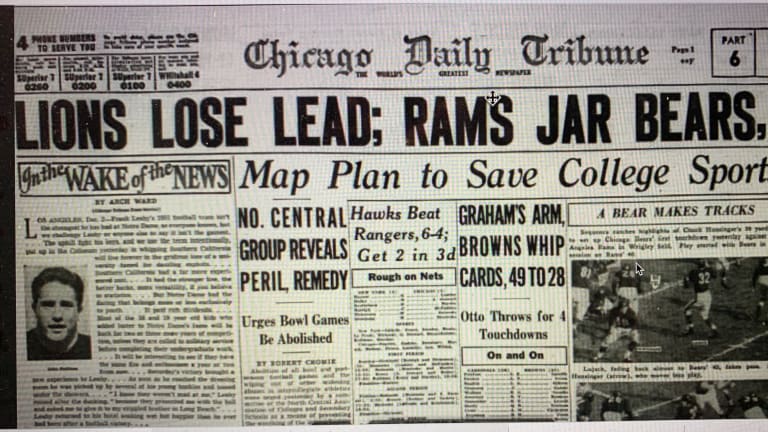
A Warning Issued—and Unheeded—About the Peril of College Sports

In 1951, the North Central Assn. of Colleges and Secondary Schools issued a report on the evils of big-time college sports.
Under the headline, ``Map Plan to Save College Sports,’’
the Chicago Tribune, in its Dec. 3 edition, detailed the dangers listed by the NCA report.
The article also included two subheads:
--``No. Central Group Reveals Peril, Remedy.’’
--``Urges Bowl Games Be Abolished.’’
Notable conclusions: The report says it is the ``business [of colleges] to educate and not to entertain the public on a commercial basis.’’ The report also condemned the practice of ``demand[ing] a winning team at all costs and dismiss[ing] coaches who do not produce such teams, despite long term contracts solemnly entered into.’’
At its pinnacle, the NCA, which was one of six regional accreditation bodies in the nation, included member institutions in 19 states ranging from Ohio to Arizona, and from Arkansas to Wyoming.
``The organization was dissolved in 2014,’’ its Wikipedia entry says.
The bowl games—and presumably the peril—are marching on.
Here are excerpts from the Trib article, written by Robert Cromie, a well-known journalist who had gone from World War II war correspondent to hosting the Book Beat television program in his wide-ranging career. . .
Abolition of all bowl and post-season football games and the wiping out of other widening abuses in intercollegiate athletics were urged yesterday by committee of the North Central Assn. of Colleges and Secondary Schools as a means of preventing the wrecking of the intercollegiate athletic program and further damage to the educational and athletic programs of both colleges and high schools throughout the nation.
The committee prepared a statement on intercollegiate athletics as the climax to a conference on the subject attended by 72 educators and officials of the association and of the National Collegiate Athletic Assn. from 12 states. . . .
Specific points listed were:
1, That colleges state as a fundamental philosophy that it is their business to educate and not to entertain the public on a commercial basis.
2, The practice of many colleges offering special financial inducements to athletes, over and above those available to all students, is indefensible and demoralizing. It is quite disturbing to see high school athletes, when they become seniors, go `shopping’ to sell their athletic ability to the highest bidding college. . . All too often the transaction is encouraged, aided and abetted by the high school coach. . .
3, To forestall the abuses of proselyting [recruiting], contact with prospective students should be made only by their admission officers thru the office of the high school principal. The practice of separate recruiting by college athletic departments is sure to lead to the abuses of today which have reach the ridiculous state.
4, Tryout and elaborate entertainment for high school students by colleges are equally undesirable.
5, Rigid standards of scholarship for intercollegiate athletic competition should be formulated, published and enforced.
7, No college scholarship should be granted except on the basis of scholastic and personal achievement for both athletes and non-athletes. The granting of athletic scholarships. . . is indefensible.
9, High schools. . . have legislated strongly against national and regional championships, bowl games, out of season practice, excessive number of games, long distance travel, interference of athletic activity with the remainder of the school program and participation in contests managed or controlled by commercial interests. But colleges, to an ever increasing degree, promote or permit these practices. They not only are the source of many evils of the college program, but create pressure on secondary schools to relax their rules.
When colleges demand a winning team at all costs and dismiss coaches who do not produce such teams, despite long term contracts solemnly entered into, local school authorities tend strongly to follow this example. If gambling, fixed games, proselyting of players, lax eligibility rules and large scale commercialization continue to grow in colleges, the effort to keep secondary school athletics honest, decent and sane will become increasingly difficult if not impossible.’'